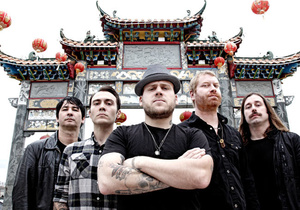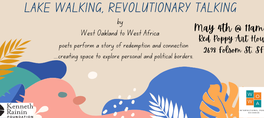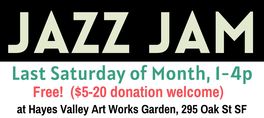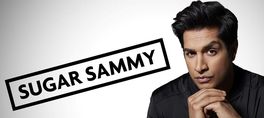For the better part of a decade, The Bronx have played provocateurs. From their beginnings as an attackmode hardcore band to their hardscrabble lives as road warriors to the twist of fate that led to their alter ego Mariachi El Bronx — an episode that itself was an act of defiance — the Los Angeles quintet has embraced a fierce independence.
And as they prepare for the February 2013 release of their fourth rock album, one thing is for certain: The Bronx have grown up, but they haven't gone soft.
"This represents the highest evolution of the band, which is exactly how it should be be," vocalist Matt Caughthran says of the album fans inevitably will come to know as The Bronx (IV). "We're the same guys, but we would never make the same record twice. And because of everything that's happened with El Bronx, we've grown as musicians. And that's why on this record you'll hear that the songs are driving everything."
The Bronx burst on the scene in 2002 with music that recalled the heyday of L.A. punk — artilleryfire guitars and percussion punctuating anguished missives about the perils of street life and the frayed edges of society. Now the band (Caughthran, guitarists Joby J. Ford and Ken Horne, bassist Brad Magers and drummer Jorma Vik) frames its aggression in different and, yes, more sophisticated ways.
"We made an effort to trim the fat and focus the ideas a lot more," Ford explains. "It helped that we're working in our own studio, with our friend (producer/engineer) Beau Burchell, and that we know what we want to do and how to get there very quickly."
The Bronx (IV) also reflects a certain musicality that the band acknowledges is a carryover from its work over two albums as a mariachi outfit. Mariachi El Bronx started as an act of rebellion in 2006 when the punk band took offense to being asked to do an acoustic performance and showed up in sombreros with a mariachi arrangement of the song "Dirty Leaves. Now El Bronx has taken on a life of its own, with its reverent, enthusiastic take on the genrewinning fans worldwide.
"I think that after doing the mariachi records, it gave us a whole new outlook and a more structured way of writing music. We figured out what works best," Vik says. "Everything is less spazzy. Matt doesn't scream as much, but he's got that thing in his voice where he can scream in pitch — mariachi has helped his confidence as a singer and ours as songwriters."
Indeed, Caughthran admits, "I found that a lot of melodies crept in subliminally and I didn't even realize it until later."
"Will both bands eventually encapsulate each other and become this horrible mariachi rock monster?" Ford says, laughing. "I wonder."
The Bronx (IV) shows no overt sign of that. It does, however, seethe with band's characteristic rage, even if that rebellion is not quite as youthful as it once was.
The single "Youth Wasted" is Caughthran's fearless look back "at a lot of the bad decisions I made," he says. "I'd like to think that as a human being I have the best intentions and I'm a good person. Sometimes it doesn't always work out that way."
"Valley Heat" makes The Bronx sound like elder statesmen. "That song's about people who will do anything and everything just to call attention to themselves," Caughthran says. "Sometimes you see young people, especially young bands, just doing all the wrong things. And you shake your head. It's easier for me to write a scathing song about that stuff than it is to give advice."
And two of the new songs were borne of The Bronx's tour adventures. "Under the Rabbit" refers to a friend of the band who smuggled booze around a festival under her rabbit fur coat. "The Unholy Hand" was inspired by a bizarre sequence of events in which Ford suffered an injury to his right hand and later, during a chance meeting with a man who turned out to be a gang member, offended him by offering a handshake with his left. "He said, 'I ain't shaking that — that's the unholy hand, bro,'" Ford recalls. "I thought, 'song title.'"
Call it another chapter of Bronx lore. For a band that survived two neardeath experiences involving their tour van in their first 18 months, that weathered label problems that undermined albums No. 2 and 3 and that even made it through a midcareer summer on the Warped Tour, it's all part of destiny that only occasionally feels in the Bronx's hands.
"We made this record on our terms," Ford says. "We don't have to rent a studio for a zillion dollars or pay some megaproducer to help us, because we've become selfreliant. It's been a long road and we're proud of it."
show less
And as they prepare for the February 2013 release of their fourth rock album, one thing is for certain: The Bronx have grown up, but they haven't gone soft.
"This represents the highest evolution of the band, which is exactly how it should be be," vocalist Matt Caughthran says of the album fans inevitably will come to know as The Bronx (IV). "We're the same guys, but we would never make the same record twice. And because of everything that's happened with El Bronx, we've grown as musicians. And that's why on this record you'll hear that the songs are driving everything."
The Bronx burst on the scene in 2002 with music that recalled the heyday of L.A. punk — artilleryfire guitars and percussion punctuating anguished missives about the perils of street life and the frayed edges of society. Now the band (Caughthran, guitarists Joby J. Ford and Ken Horne, bassist Brad Magers and drummer Jorma Vik) frames its aggression in different and, yes, more sophisticated ways.
"We made an effort to trim the fat and focus the ideas a lot more," Ford explains. "It helped that we're working in our own studio, with our friend (producer/engineer) Beau Burchell, and that we know what we want to do and how to get there very quickly."
The Bronx (IV) also reflects a certain musicality that the band acknowledges is a carryover from its work over two albums as a mariachi outfit. Mariachi El Bronx started as an act of rebellion in 2006 when the punk band took offense to being asked to do an acoustic performance and showed up in sombreros with a mariachi arrangement of the song "Dirty Leaves. Now El Bronx has taken on a life of its own, with its reverent, enthusiastic take on the genrewinning fans worldwide.
"I think that after doing the mariachi records, it gave us a whole new outlook and a more structured way of writing music. We figured out what works best," Vik says. "Everything is less spazzy. Matt doesn't scream as much, but he's got that thing in his voice where he can scream in pitch — mariachi has helped his confidence as a singer and ours as songwriters."
Indeed, Caughthran admits, "I found that a lot of melodies crept in subliminally and I didn't even realize it until later."
"Will both bands eventually encapsulate each other and become this horrible mariachi rock monster?" Ford says, laughing. "I wonder."
The Bronx (IV) shows no overt sign of that. It does, however, seethe with band's characteristic rage, even if that rebellion is not quite as youthful as it once was.
The single "Youth Wasted" is Caughthran's fearless look back "at a lot of the bad decisions I made," he says. "I'd like to think that as a human being I have the best intentions and I'm a good person. Sometimes it doesn't always work out that way."
"Valley Heat" makes The Bronx sound like elder statesmen. "That song's about people who will do anything and everything just to call attention to themselves," Caughthran says. "Sometimes you see young people, especially young bands, just doing all the wrong things. And you shake your head. It's easier for me to write a scathing song about that stuff than it is to give advice."
And two of the new songs were borne of The Bronx's tour adventures. "Under the Rabbit" refers to a friend of the band who smuggled booze around a festival under her rabbit fur coat. "The Unholy Hand" was inspired by a bizarre sequence of events in which Ford suffered an injury to his right hand and later, during a chance meeting with a man who turned out to be a gang member, offended him by offering a handshake with his left. "He said, 'I ain't shaking that — that's the unholy hand, bro,'" Ford recalls. "I thought, 'song title.'"
Call it another chapter of Bronx lore. For a band that survived two neardeath experiences involving their tour van in their first 18 months, that weathered label problems that undermined albums No. 2 and 3 and that even made it through a midcareer summer on the Warped Tour, it's all part of destiny that only occasionally feels in the Bronx's hands.
"We made this record on our terms," Ford says. "We don't have to rent a studio for a zillion dollars or pay some megaproducer to help us, because we've become selfreliant. It's been a long road and we're proud of it."
For the better part of a decade, The Bronx have played provocateurs. From their beginnings as an attackmode hardcore band to their hardscrabble lives as road warriors to the twist of fate that led to their alter ego Mariachi El Bronx — an episode that itself was an act of defiance — the Los Angeles quintet has embraced a fierce independence.
And as they prepare for the February 2013 release of their fourth rock album, one thing is for certain: The Bronx have grown up, but they haven't gone soft.
"This represents the highest evolution of the band, which is exactly how it should be be," vocalist Matt Caughthran says of the album fans inevitably will come to know as The Bronx (IV). "We're the same guys, but we would never make the same record twice. And because of everything that's happened with El Bronx, we've grown as musicians. And that's why on this record you'll hear that the songs are driving everything."
The Bronx burst on the scene in 2002 with music that recalled the heyday of L.A. punk — artilleryfire guitars and percussion punctuating anguished missives about the perils of street life and the frayed edges of society. Now the band (Caughthran, guitarists Joby J. Ford and Ken Horne, bassist Brad Magers and drummer Jorma Vik) frames its aggression in different and, yes, more sophisticated ways.
"We made an effort to trim the fat and focus the ideas a lot more," Ford explains. "It helped that we're working in our own studio, with our friend (producer/engineer) Beau Burchell, and that we know what we want to do and how to get there very quickly."
The Bronx (IV) also reflects a certain musicality that the band acknowledges is a carryover from its work over two albums as a mariachi outfit. Mariachi El Bronx started as an act of rebellion in 2006 when the punk band took offense to being asked to do an acoustic performance and showed up in sombreros with a mariachi arrangement of the song "Dirty Leaves. Now El Bronx has taken on a life of its own, with its reverent, enthusiastic take on the genrewinning fans worldwide.
"I think that after doing the mariachi records, it gave us a whole new outlook and a more structured way of writing music. We figured out what works best," Vik says. "Everything is less spazzy. Matt doesn't scream as much, but he's got that thing in his voice where he can scream in pitch — mariachi has helped his confidence as a singer and ours as songwriters."
Indeed, Caughthran admits, "I found that a lot of melodies crept in subliminally and I didn't even realize it until later."
"Will both bands eventually encapsulate each other and become this horrible mariachi rock monster?" Ford says, laughing. "I wonder."
The Bronx (IV) shows no overt sign of that. It does, however, seethe with band's characteristic rage, even if that rebellion is not quite as youthful as it once was.
The single "Youth Wasted" is Caughthran's fearless look back "at a lot of the bad decisions I made," he says. "I'd like to think that as a human being I have the best intentions and I'm a good person. Sometimes it doesn't always work out that way."
"Valley Heat" makes The Bronx sound like elder statesmen. "That song's about people who will do anything and everything just to call attention to themselves," Caughthran says. "Sometimes you see young people, especially young bands, just doing all the wrong things. And you shake your head. It's easier for me to write a scathing song about that stuff than it is to give advice."
And two of the new songs were borne of The Bronx's tour adventures. "Under the Rabbit" refers to a friend of the band who smuggled booze around a festival under her rabbit fur coat. "The Unholy Hand" was inspired by a bizarre sequence of events in which Ford suffered an injury to his right hand and later, during a chance meeting with a man who turned out to be a gang member, offended him by offering a handshake with his left. "He said, 'I ain't shaking that — that's the unholy hand, bro,'" Ford recalls. "I thought, 'song title.'"
Call it another chapter of Bronx lore. For a band that survived two neardeath experiences involving their tour van in their first 18 months, that weathered label problems that undermined albums No. 2 and 3 and that even made it through a midcareer summer on the Warped Tour, it's all part of destiny that only occasionally feels in the Bronx's hands.
"We made this record on our terms," Ford says. "We don't have to rent a studio for a zillion dollars or pay some megaproducer to help us, because we've become selfreliant. It's been a long road and we're proud of it."
read more
And as they prepare for the February 2013 release of their fourth rock album, one thing is for certain: The Bronx have grown up, but they haven't gone soft.
"This represents the highest evolution of the band, which is exactly how it should be be," vocalist Matt Caughthran says of the album fans inevitably will come to know as The Bronx (IV). "We're the same guys, but we would never make the same record twice. And because of everything that's happened with El Bronx, we've grown as musicians. And that's why on this record you'll hear that the songs are driving everything."
The Bronx burst on the scene in 2002 with music that recalled the heyday of L.A. punk — artilleryfire guitars and percussion punctuating anguished missives about the perils of street life and the frayed edges of society. Now the band (Caughthran, guitarists Joby J. Ford and Ken Horne, bassist Brad Magers and drummer Jorma Vik) frames its aggression in different and, yes, more sophisticated ways.
"We made an effort to trim the fat and focus the ideas a lot more," Ford explains. "It helped that we're working in our own studio, with our friend (producer/engineer) Beau Burchell, and that we know what we want to do and how to get there very quickly."
The Bronx (IV) also reflects a certain musicality that the band acknowledges is a carryover from its work over two albums as a mariachi outfit. Mariachi El Bronx started as an act of rebellion in 2006 when the punk band took offense to being asked to do an acoustic performance and showed up in sombreros with a mariachi arrangement of the song "Dirty Leaves. Now El Bronx has taken on a life of its own, with its reverent, enthusiastic take on the genrewinning fans worldwide.
"I think that after doing the mariachi records, it gave us a whole new outlook and a more structured way of writing music. We figured out what works best," Vik says. "Everything is less spazzy. Matt doesn't scream as much, but he's got that thing in his voice where he can scream in pitch — mariachi has helped his confidence as a singer and ours as songwriters."
Indeed, Caughthran admits, "I found that a lot of melodies crept in subliminally and I didn't even realize it until later."
"Will both bands eventually encapsulate each other and become this horrible mariachi rock monster?" Ford says, laughing. "I wonder."
The Bronx (IV) shows no overt sign of that. It does, however, seethe with band's characteristic rage, even if that rebellion is not quite as youthful as it once was.
The single "Youth Wasted" is Caughthran's fearless look back "at a lot of the bad decisions I made," he says. "I'd like to think that as a human being I have the best intentions and I'm a good person. Sometimes it doesn't always work out that way."
"Valley Heat" makes The Bronx sound like elder statesmen. "That song's about people who will do anything and everything just to call attention to themselves," Caughthran says. "Sometimes you see young people, especially young bands, just doing all the wrong things. And you shake your head. It's easier for me to write a scathing song about that stuff than it is to give advice."
And two of the new songs were borne of The Bronx's tour adventures. "Under the Rabbit" refers to a friend of the band who smuggled booze around a festival under her rabbit fur coat. "The Unholy Hand" was inspired by a bizarre sequence of events in which Ford suffered an injury to his right hand and later, during a chance meeting with a man who turned out to be a gang member, offended him by offering a handshake with his left. "He said, 'I ain't shaking that — that's the unholy hand, bro,'" Ford recalls. "I thought, 'song title.'"
Call it another chapter of Bronx lore. For a band that survived two neardeath experiences involving their tour van in their first 18 months, that weathered label problems that undermined albums No. 2 and 3 and that even made it through a midcareer summer on the Warped Tour, it's all part of destiny that only occasionally feels in the Bronx's hands.
"We made this record on our terms," Ford says. "We don't have to rent a studio for a zillion dollars or pay some megaproducer to help us, because we've become selfreliant. It's been a long road and we're proud of it."
show less
Date/Times:
The Independent
85 Upcoming Events
628 Divisadero Street, San Francisco, CA 94117
The Best Events
Every Week in Your Inbox
From Our Sponsors
UPCOMING EVENTS
Great suggestion! We'll be in touch.
Event reviewed successfully.









